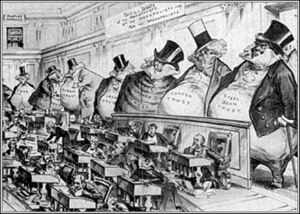Remember When We Had Anti-Trust Laws?
Image via Wikipedia Oh those were the days, but like everything else that falls within the realm of common sense, that too has become extinct: Over the last few years, drug-makers have embraced a startlingly simple tactic for fending off competition from generic brands: paying them off. In a nutshell, the company that holds the […]

Image via Wikipedia
Oh those were the days, but like everything else that falls within the realm of common sense, that too has become extinct:
Over the last few years, drug-makers have embraced a startlingly simple tactic for fending off competition from generic brands: paying them off. In a nutshell, the company that holds the patent on a profitable drug strikes a deal with the maker of the cheaper generic brand: you hold off on marketing your generic for several years, and in return, we’ll give you a share of our profits on the drug.
The vehicle for these deals is patent litigation. When a generic drug is approved to come to market, the maker of the more expensive name-brand drug sues the generic for patent infringement. But instead of a conventional settlement, in which the generic pays the patent-holder to settle the claim that it infringed the patent, the payment goes the other way: the patent-holder pays the maker of the generic, in exchange for a pledge to delay bringing the generic to market. That suggests the patent-holder fears its patent wouldn’t hold up in court, as many don’t. And it runs counter to the intent of the Hatch-Waxman Act of 1984, which sought to speed the path of generics to market, and to provide a legal framework for these cases.
Next time you are forking out that $50 co-pay for your common perscription be sure to thank the drug companies and a government that doesn’t take things like anti-trust laws seriously.

![Reblog this post [with Zemanta]](http://img.zemanta.com/reblog_e.png?x-id=bab59a78-e196-4a66-9e90-109c4e936370)





